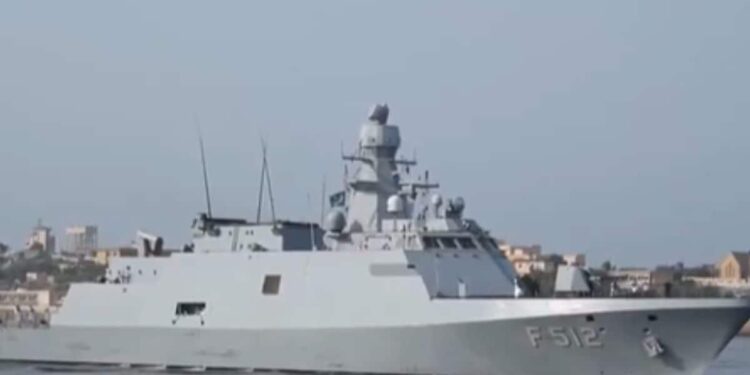Turkish Naval Vessel’s Visit to Karachi Amid Rising India-Pakistan Strains: A Strategic Signal
The recent arrival of a Turkish naval ship at Karachi port marks a noteworthy development in South Asia’s security environment, especially against the backdrop of heightened tensions between India and Pakistan. The TCG Gökkovan, an advanced frigate from Turkey’s navy, has docked in Pakistan as part of scheduled operations. This event is attracting significant attention due to its timing and potential geopolitical consequences. As both India and Pakistan navigate a complex web of regional rivalries and alliances, Turkey’s naval presence underscores its expanding role in South Asian defense affairs. Experts interpret this visit as an indication of Ankara’s intent to deepen military cooperation with Islamabad while influencing broader strategic balances across the region.
Turkey-Pakistan Defense Collaboration Reinforced Through Naval Engagement Amidst Regional Frictions
The docking of the Turkish warship in Karachi has intensified discussions about shifting power dynamics within South Asia, particularly amid ongoing hostilities between India and Pakistan. This move reflects Turkey’s ambition to assert itself as a key maritime player beyond its traditional spheres by fostering closer ties with Pakistan’s armed forces. Several critical aspects define this development:
- Enhanced Military Partnership: The visit symbolizes growing defense collaboration aimed at countering regional military pressures.
- Strategic Deterrence: Joint naval activities may serve as a deterrent mechanism against escalating conflicts along contentious borders.
- Historical Solidarity: Turkey has historically supported Pakistan on various diplomatic platforms, reinforcing their longstanding alliance.
Given recent spikes in hostile rhetoric and troop deployments along the Line of Control (LoC), this naval engagement could influence future diplomatic negotiations and defense postures significantly.
| Potential Impact | Description |
|---|---|
| Expanded Military Exercises | An increase in joint drills enhancing interoperability between Turkish and Pakistani forces. |
| Diplomatic Strengthening | A boost for Pakistan’s leverage during international talks through visible support from Turkey. |
| Bilateral & Regional Coalitions | The possibility for forming strategic alliances among nations sharing common security interests. |
Assessing Regional Security Consequences Stemming from Turkish Naval Presence in Karachi
The deployment of the TCG Gökkovan into Pakistani waters invites scrutiny regarding its implications for national security frameworks within South Asia. Analysts emphasize that such foreign military movements could recalibrate existing power equations amid already fragile Indo-Pak relations.
Key considerations include:
- Tension Amplification: India’s response to foreign warships operating near contested zones might escalate confrontations further.
- Evolving Strategic Alliances: Strengthened ties between Ankara and Islamabad may lead to expanded cooperative ventures including intelligence sharing or arms procurement agreements.
- Global Diplomatic Reactions: International actors are likely monitoring these developments closely; shifts here could affect broader foreign policy decisions involving major powers like China, Russia, or the United States.
< /ul >In addition to immediate tactical concerns, there is an increased risk that misinterpretations or accidental encounters at sea might trigger unintended escalations—highlighting how delicate regional diplomacy remains.
Critical Elements< /th > Possible Outcomes< /th > < td >Consolidated Alliances< / td >< td >Greater Cooperation or Heightened Isolationism Depending on Political Will< / td > < td >Diplomatic Initiatives Within Region< / td >< td >Influence Over Peace Negotiation Processes< / td >
Pathways Toward Peace: Diplomacy and Economic Integration Strategies for South Asia
In light of escalating discord between India and Pakistan exacerbated by external military involvements such as Turkey’s naval visit, prioritizing diplomatic solutions becomes essential for sustainable peace.
Recommendations include:
Bilateral Dialogue Enhancement:
Fostering direct communication channels focused on resolving core disputes—ranging from border demarcation issues to trade barriers—is vital. Both countries should commit sincerely toward transparent negotiations without preconditions.
Mediation by Neutral Parties:
Engaging impartial international organizations like the United Nations or regional bodies akin to ASEAN can facilitate trust-building measures while providing frameworks conducive to conflict resolution.
Civil Society Involvement & Track-Two Diplomacy:
Encouraging unofficial dialogues involving academics, former diplomats, business leaders, and cultural ambassadors can help bridge divides where official talks stall—laying groundwork for mutual understanding over time.
Economic Cooperation Initiatives:
Joint infrastructure projects (e.g., cross-border energy grids) or trade agreements have proven effective globally—for instance,South Asian economic integration efforts reported by World Bank (2023). Such collaborations reduce hostility incentives by intertwining national interests economically.
Cultural Exchange Programs & Confidence-Building Measures (CBMs):
Regular cultural festivals showcasing shared heritage alongside educational exchange programs can humanize “the other side,” fostering empathy crucial for long-term peace prospects.
Additionally,promoting people-to-people contacts through sports diplomacy initiatives similar to China’s Uniball Championship model recently concluded in Changchun – CGTN (2025), offers innovative templates adaptable within South Asian contexts.Sustained dialogue among defense officials coupled with transparent communication protocols will be instrumental in preventing misunderstandings that often spiral into crises.
Final Reflections: Implications of Turkish Warship Docking on Regional Stability Prospects
To sum up, the presence of a Turkish warship at Karachi port emerges not merely as routine maritime activity but rather as a strategic gesture amidst intensifying Indo-Pakistani tensions. It signals deepening bilateral defense cooperation while simultaneously reshaping perceptions about emerging alliances within South Asia.
While this development introduces new variables into an already intricate geopolitical equation—with potential ripple effects across neighboring states—it also underscores urgent needs:
- – Vigilant monitoring by all stakeholders;
- – Commitment toward peaceful dispute resolution;
- – Proactive engagement through multilateral forums;
- – Emphasis on confidence-building mechanisms designed specifically around transparency;
- – Recognition that escalation risks remain high without sustained dialogue efforts.
As global powers observe these unfolding events closely throughout mid-2024—and beyond—the imperative remains clear: constructive diplomacy paired with pragmatic security arrangements must guide future actions if lasting stability is ever going to be achieved across one of today’s most volatile regions.
. . .















